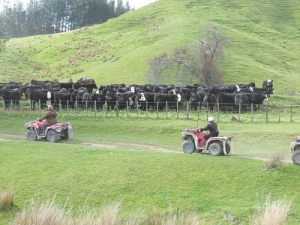On Your Behalf: Health and Safety Checklist for Vineyards and Wineries
Keeping healthy and safe during vintage 2026
 The vexed issue of quad bike safety is just one of the concerns farmers must consider with changes to health and safety laws coming.
The vexed issue of quad bike safety is just one of the concerns farmers must consider with changes to health and safety laws coming.
Farmers are anxious about what the health and safety reform will bring and the new challenges that lie on the horizon.
We all want to come home from work alive. Unfortunately, this will not always happen as you just can’t eliminate all the risk from farming.
My own personal experience of a fatality on my own farm still haunts me to this day. Going through a police and OSH investigation was nothing compared to the emotion of meeting the parents the following day to try to explain what may have happened. I take every practical step to prevent accidents happening, but the world we live in is not perfect.
We need to take health and safety seriously, but we need to make sure this doesn’t become a bureaucratic box ticking exercise which adds to farmers already mounting compliance pressures. More important still is that the practical and the lifestyle on the farm doesn’t get wiped out forever. We need the ‘social licence’ to farm.
I appreciate businesses all over the country are dealing with this same issue, but talking to other industries about the frustration and extra costs is only one part of the challenge for farmers. With a farm it is not just a case of putting extra scaffolding around a building. The farm is often a wide environment with all sorts of different contours, vehicles, animals and buildings. A farm is often an extension of the backyard so the question is where does the business of farming start and stop?
A farm is not just a business, it is a home and a playground. We often share the land with recreational users: hikers, mountain bikers, fishers, hunters, people wanting to pick mushrooms or gather pine cones. It is also a school: farmers’ children, their friends and/or cousins often help with activities such as haymaking, mustering, etc and pick up skills that help them become the next generation of farmers.
So while we now need the social licence to farm, should farmers need a social licence to bring up a family and share their land with the public for recreational use? If the risks are too great the first thing to go will be the free access to nature’s playground.
Unfortunately, we as individuals are not made responsible for ourselves anymore. In the farmer’s case the consequences of an accident happening to someone on their farm, whether it was the result of their own actions or not, puts them under intense scrutiny. Don’t get me wrong, farmers should take responsibility for the health and safety of people on farm, but there is a time when people need to take responsibility for themselves.
What makes it more difficult is that the boundaries between work and home are blurred. When your workplace is your home and it is an integral part of how you raise your family, it makes it pretty difficult to distinguish between the two under the regulatory culture we have.
Many farmers dream of raising their children on a farm so they can experience the privileged upbringing they enjoyed or that they wished they’d had; this is now at risk of being denied. If health and safety regulation cannot differ between the two then we have a real problem, as essentially farming parents are being told how they are allowed to interact with their children. This is far from natural and would make any farmer indignant.
So let’s use common sense and work with each other to come up with practical health and safety measures that help reduce accidents, rather than jumping to extremes as we like to do. Productivity is not just in the paddock, it’s at the table where we can all meet and come up with real-world solutions.
• James Stewart is Federated Farmers Manawatu-Rangitikei provincial president.
Donald Trump's latest tariff tantrum has again thrown the world of trade into a new round of turmoil and uncertainty, and NZ is caught up in it.
The third edition of the NZ Dairy Expo, held in mid-February in Matamata, has shown that the KISS principle (keep it simple stupid) was getting a positive response from exhibitors and visitors alike.
Twenty years ago, South African dairy farm manager Louis Vandenberg was sent to a farm in Waikato to provide training on Afimilk technology.
Strong farmgate milk price is helping boost investment on farms, says PGG Wrightson chief executive Stephen Guerin.
Fonterra's 460 milk suppliers in Australia, who will switch to Lactalis end of this month, are unfazed with the impending change.
The 5+ A Day Charitable Trust has launched a collection of affordable recipes designed to turn everyday vegetables into seasonal stars.